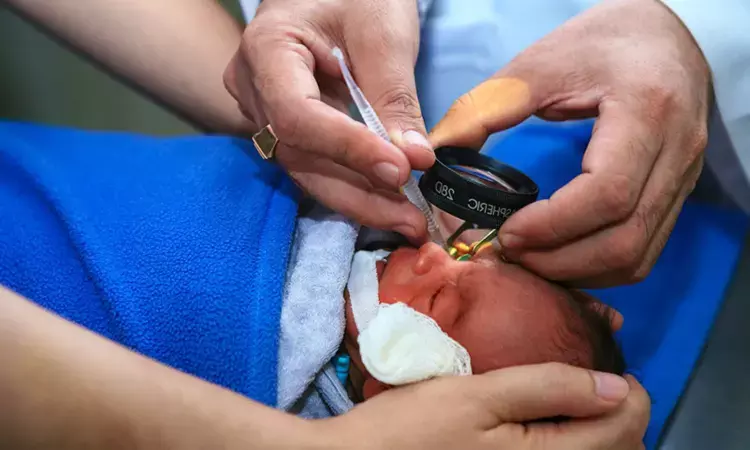- Home
- Medical news & Guidelines
- Anesthesiology
- Cardiology and CTVS
- Critical Care
- Dentistry
- Dermatology
- Diabetes and Endocrinology
- ENT
- Gastroenterology
- Medicine
- Nephrology
- Neurology
- Obstretics-Gynaecology
- Oncology
- Ophthalmology
- Orthopaedics
- Pediatrics-Neonatology
- Psychiatry
- Pulmonology
- Radiology
- Surgery
- Urology
- Laboratory Medicine
- Diet
- Nursing
- Paramedical
- Physiotherapy
- Health news
- Fact Check
- Bone Health Fact Check
- Brain Health Fact Check
- Cancer Related Fact Check
- Child Care Fact Check
- Dental and oral health fact check
- Diabetes and metabolic health fact check
- Diet and Nutrition Fact Check
- Eye and ENT Care Fact Check
- Fitness fact check
- Gut health fact check
- Heart health fact check
- Kidney health fact check
- Medical education fact check
- Men's health fact check
- Respiratory fact check
- Skin and hair care fact check
- Vaccine and Immunization fact check
- Women's health fact check
- AYUSH
- State News
- Andaman and Nicobar Islands
- Andhra Pradesh
- Arunachal Pradesh
- Assam
- Bihar
- Chandigarh
- Chattisgarh
- Dadra and Nagar Haveli
- Daman and Diu
- Delhi
- Goa
- Gujarat
- Haryana
- Himachal Pradesh
- Jammu & Kashmir
- Jharkhand
- Karnataka
- Kerala
- Ladakh
- Lakshadweep
- Madhya Pradesh
- Maharashtra
- Manipur
- Meghalaya
- Mizoram
- Nagaland
- Odisha
- Puducherry
- Punjab
- Rajasthan
- Sikkim
- Tamil Nadu
- Telangana
- Tripura
- Uttar Pradesh
- Uttrakhand
- West Bengal
- Medical Education
- Industry
Recurrent culture-proven sepsis linked to retinopathy of prematurity in neonates: JAMA

A new study published in the Journal of American Medical Association suggests that repeated culture-proven sepsis should be recognized as a modifiable risk factor linked to retinopathy of prematurity in extremely preterm newborns.
Retinopathy of prematurity (ROP) is a significant morbidity associated with preterm newborns that results in visual impairment, including blindness. Prevention and prompt treatment are essential to combat this condition. There is mounting evidence that the development of ROP is facilitated by exposure to neonatal sepsis. In order to better understand the relationship between neonatal sepsis and ROP in two sizable cohorts of preterm children born at fewer than 29 weeks of gestation, Kirsten Glaser and colleagues undertook this study.
The data from the Norwegian Neonatal Network (NNN) and German Neonatal Network (GNN) were utilized in this retrospective cohort analysis. There were 68 level III neonatal critical care units in the GNN and 21 in the NNN. The newborns for this research were recruited in the GNN between January 1, 2009 and December 31, 2022, and the NNN between January 1, 2009 and December 31, 2018. They ranged in gestation from 22 weeks and 0 days to 28 weeks and 6 days. From February through September of 2023, the data obtained were examined.
This study included the mean (SD) birth weight of the 12,794 newborns in the GNN were 848 (229) g and the 1844 infants included in the NNN were 807 (215) g. 6370 newborns (49.8%) in GNN and 620 infants (33.6%) in NNN had any ROP, whereas 840 infants (6.6%) in GNN and 140 infants (7.6%) in NNN had treatment-warranted ROP.
With every incident of sepsis in both groups, the incidence of treatment-warranted ROP increased. Following the GNN multiple confounders' adjustment of this dataset, the number of sepsis episodes was linked to both ROP and treatment-warranted ROP when compared to 0 episodes. Propensity score matching verified these connections for any ROP. Also, the surgical NEC was linked to treatment-warranted ROP in the NNN dataset.
The outcome of this large-scale cohort analysis found that in preterm children delivered at fewer than 29 weeks, ROP and treatment-warranted ROP were particularly linked with culture-proven neonatal sepsis and recurrent sepsis episodes. It is important to do more research to determine the underlying processes of any inflammation-driven retinal morbidity and to determine if this connection is causative
Reference:
Glaser, K., Härtel, C., Klingenberg, C., Herting, E., Fortmann, M. I., Speer, C. P., Stensvold, H. J., Huncikova, Z., Rønnestad, A. E., Nentwich, M. M., Stahl, A., Dammann, O., Göpel, W., Faust, K., Müller, D., Thome, U., Guthmann, F., von der Wense, A., … Wieg, C. (2024). Neonatal Sepsis Episodes and Retinopathy of Prematurity in Very Preterm Infants. In JAMA Network Open (Vol. 7, Issue 7, p. e2423933). American Medical Association (AMA). https://doi.org/10.1001/jamanetworkopen.2024.23933
Neuroscience Masters graduate
Jacinthlyn Sylvia, a Neuroscience Master's graduate from Chennai has worked extensively in deciphering the neurobiology of cognition and motor control in aging. She also has spread-out exposure to Neurosurgery from her Bachelor’s. She is currently involved in active Neuro-Oncology research. She is an upcoming neuroscientist with a fiery passion for writing. Her news cover at Medical Dialogues feature recent discoveries and updates from the healthcare and biomedical research fields. She can be reached at editorial@medicaldialogues.in
Dr Kamal Kant Kohli-MBBS, DTCD- a chest specialist with more than 30 years of practice and a flair for writing clinical articles, Dr Kamal Kant Kohli joined Medical Dialogues as a Chief Editor of Medical News. Besides writing articles, as an editor, he proofreads and verifies all the medical content published on Medical Dialogues including those coming from journals, studies,medical conferences,guidelines etc. Email: drkohli@medicaldialogues.in. Contact no. 011-43720751


